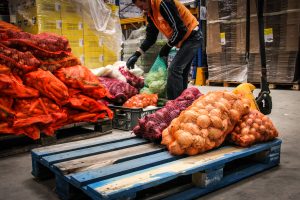Are you a business owner with unsold high-quality food?
Donate it to Food Banks as a gift without tax burdens and help those in need!
Please contact your nearest Food Bank, email: pozysk@bankizywnosci.pl or phone: 735 962 906.

What products can be donated to the Food Bank?

Considering the needs of the people receiving donated food, Food Banks accept all types of food items – including those with a short shelf life (provided at least 2 days before the expiry date). You can donate to us:
- Fresh and seasonal products such as bread, fruits, vegetables,
- Perishable or refrigerated products, e.g., yoghurts, cheeses, butter, meat, or sausages,
- Durable products such as pasta, rice, grains, and oils.
What happens to your donation?
After receiving food from the donor, it is stored in the warehouses of Food Banks. The storage of donated items is carried out while ensuring appropriate sanitary and hygiene conditions (in accordance with HACCP principles) and any additional storage and transportation guidelines provided by the donor.
The Food Bank registers donations in the warehouse system according to the document received from the donor and confirmed upon receipt of the donation. This allows for full transparency in the distribution of donations.
To confirm the transfer of products to the Food Bank, the entrepreneur receives a delivery-acceptance protocol, a warehouse release document, an internal invoice, or a donation agreement.

Why donate food?
First and foremost, you’re helping those in greatest need: single mothers, elderly individuals, the sick and disabled, those recovering from addiction, and many others who find themselves in difficult life situations. In Poland, 1.6 million people live below the extreme poverty line, meaning they have less than 600 PLN per month for living expenses. Every day, they face the dilemma of whether to buy food, medicine, or pay bills.
Food Banks distribute acquired food to partner social organizations such as childcare centers, children’s aid societies, single mother shelters, soup kitchens, and associations.
By donating food with a short shelf life, you also prevent food waste and contribute to environmental protection. Collaborating with Food Banks in this regard can become an important element of your company’s CSR policy.
Zobacz film o tym, jak działamy i komu pomagamy oraz o naszej współpracy z biznesem:
But that’s not all. Food donations also allow for:
- VAT exemption: Food donors to public benefit organizations are exempt from VAT on donations if the donation is intended for charitable activities conducted by that organization.
- Inclusion of the value of food donations as deductible costs: Every entrepreneur who donates food to Food Banks can include the purchase price or production cost as deductible costs, thereby reducing the tax base for CIT.

